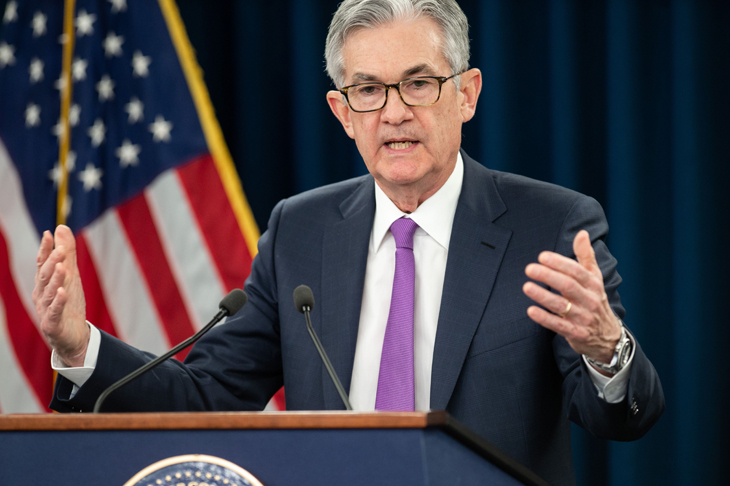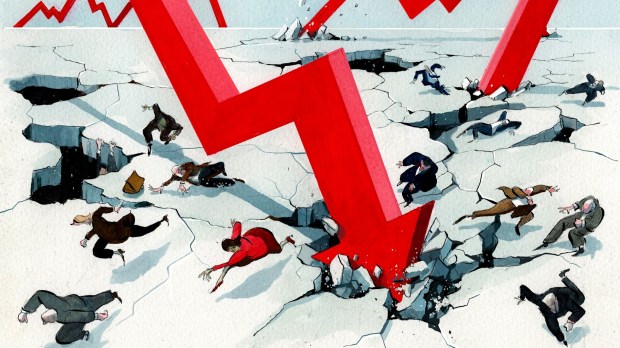Has ‘Jay’ Powell gone wobbly, or does he know something we don’t? That was the question being asked after the US Federal Reserve, of which Powell is chairman, kept dollar interest rates on hold last week — rather than continuing to notch them upwards as it has been doing for two years — and hinted that the next move might actually be downwards.
Trade tension with China, the impact of Donald Trump’s government shutdown and the risk of a no-deal Brexit were all cited as ‘cross-currents’ affecting the decision, but pundits led by Wall Street ‘bond king’ Jeffrey Gundlach declared the Fed to be ‘caving in’ to the demands of the stock market and the President. Trump had been tweeting against Powell, the respected financier he appointed to the central bank chair a year ago, warning him not to make ‘yet another mistake’ with a rate rise based on ‘meaningless numbers’ (presumably that’s economic data) rather than market sentiment, which perpetually favours cheap money.
More noteworthy, perhaps, are the comments of Jim Cramer on CNBC’s Mad Money television show. ‘The only thing Powell caved to is reality,’ Cramer declared. Continuing rate rises close to a turning point in the cycle would have brought ‘a lot more devastation to Main Street than to Wall Street… He didn’t want to be the guy who ended the expansion. He didn’t want to be the reason we went into a recession.’
When Italy was announced to have fallen into recession in the last quarter of 2018, the international response was largely: ‘Oh well, that’s Italy for you: so what?’ But when recession creeps back into America’s vocabulary and the Fed executes a sudden U-turn, there’s a rumble of distant thunder.
End of an era
‘Poka-yoke’ is a Japanese expression I first heard — spoken in a Wearside accent — on a tour of the Nissan factory at Sunderland in the mid-1990s. It means eliminating human errors by spotlighting them and making sure they don’t happen again, and we might guess that it’s not a concept much applied in Downing Street these days. But it helped make Nissan’s £4 billion UK flagship one of the most efficient car factories in the world; and it’s worth reflecting on that plant’s symbolic importance, now we know that the next-generation X-Trail SUV will no longer be built there (as previously pledged, after Business Secretary Greg Clark’s under-the-table offer of cash support) but in Japan.
It’s clear that Nissan’s decision was largely to do with the collapse of the European diesel car market that I’ve been writing about for months, and partly to do with the Nissan board’s urge to take power back to Japan that also seems to lie behind the incarceration of former chairman Carlos Ghosn. In addition, a spokesman said: ‘The uncertainty around the UK’s future relationship with the EU is not helping companies like ours to plan for the future.’ It’s wrong to paint the 700 Sunderland workers who would have built the X-Trail as victims of Brexit chaos. But history will record Nissan’s decision, coinciding with a collapse of capital investment across the industry since 2016, as the end of an era.
Nissan came to Sunderland in 1984 because the Japanese liked Margaret Thatcher’s pro-business stance and her ministers’ eagerness to help; also because land was cheap, skilled workers and engineers were available, unions were co-operative and English was spoken; the site was the ideal launch pad for European markets. Now, without coherence from government or clarity on future business conditions, our competitive edge is largely lost. The Nissan factory, being the best, will survive longer than most; but British carmaking as a whole is destined, I fear, to shrink back to the 1970s.
Year of the Pig
Happy Chinese New Year, or at least let’s hope so. The chubby pig of 2019 is an obvious symbol of wealth; but being both pragmatists and optimists where money is concerned, the Chinese easily find reasons to associate all 12 of their zodiac creatures, (including 2018’s dog) with rising prosperity. This year, however, the amount spent by their shoppers and tourists during the New Year festivities will be compared against last year’s figure of $190 billion for signs of a weakening economy.
We already know that trade tensions with the US and other negative factors have been afflicting Chinese sales of western imports, from iPhones to Land Rovers, and that property and shares have been afflicted too, with the Shanghai stock market down by half from its 2015 peak. Official Chinese statistics are always to be treated with suspicion, but this week’s spending on (genuine) Rolex watches and Louis Vuitton handbags in airport duty-free shops, on gold jewellery in Hong Kong and on the casino tables of Macau, will be a real indicator of the seriousness of China’s downturn.
Good out of chaos
David Harding is a billionaire hedge fund manager who has just given £100 million to Cambridge University, largely to fund PhD students. Himself a Cambridge physicist, Harding is the brain behind Winton -Capital, whose futures fund reaped £800 million on positions in gold, commodities and bonds immediately after the referendum in 2016, more than compensating Harding for the £3.5 million he had personally poured into the Remain campaign.
He said at the time that the windfall was ‘not mine… it’s money we have made for pensioners around the world’. But if his share of Winton’s fees on the fund’s -Brexit bonanza covered most of his Cambridge gift, this is an interesting example of good coming out of chaos. And detractors can’t snipe at Harding for throwing his philanthrocapitalist weight around from some offshore hideaway, since he also appears in the ‘Top 50 UK taxpayers’ list featured here last week, ranking 28th with £24 million tax paid. Hats off to him.
Got something to add? Join the discussion and comment below.
Get 10 issues for just $10
Subscribe to The Spectator Australia today for the next 10 magazine issues, plus full online access, for just $10.
You might disagree with half of it, but you’ll enjoy reading all of it. Try your first month for free, then just $2 a week for the remainder of your first year.















Comments
Don't miss out
Join the conversation with other Spectator Australia readers. Subscribe to leave a comment.
SUBSCRIBEAlready a subscriber? Log in